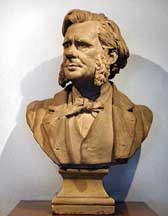JUNE 5 [1877]. Being at the Zoological Gardens, I looked in at the Lecture Room. Huxley was lecturing. A dark-complexioned man, with deepset eyes, prominent forehead and turned-up nose, thick rather coarse hair slightly streaked with grey, parted on one side, and brushed back from his forehead in the middle; lower part of the cheeks a little flabby making a sort of fold overarching the mouth; lips loose and mouth working; fidgety, rather excitable in manner, passing the back of his hand across his nose nervously, but as if from habit, not in the least from diffidence. He spoke in a low conversational tone; taking a snake from a box, handling and describing it; explaining some of the motions of its head and body by pawing with his hand in the air. — Alfred Domett, Diary, 228

Biographical Materials
- Coins the words Agnosticism and Agnostic
- Works
- Review of Darwin's The origin of Species in the Westminster Review
- Man's Place in Nature (1863)
- Member of the Athenaeum Club
- Member, with Tyndall, of the famous X Club
- Vice-President of the Zoological Society
Cultural Contexts
- Huxley and the Arts
Intellectual Relations
- Influenced by Comte
- Ruskin responds to Huxley on evolution
- Discussed in relation to "the science of homologies" by George Campbell, the Duke of Argyll's The Reign of Law.
- Matthew Arnold on Huxley
- Arnold responds to Huxley's attack on classical studies in "Science and Culture" (1880)
- Agrees with Newman that Oxford literary humanism depends on theological values
- As editor of Economist, Herbert Spencer successfuly solicits Huxley's contributions
- Believes Owen tried to steal credit for Darwin's discoveries
- Huxley convinces Darwin not to respond to Samuel Butler
- What Actually Happened at the 1860 Wilberforce-Huxley Debate?
Last modified 9 May 2020